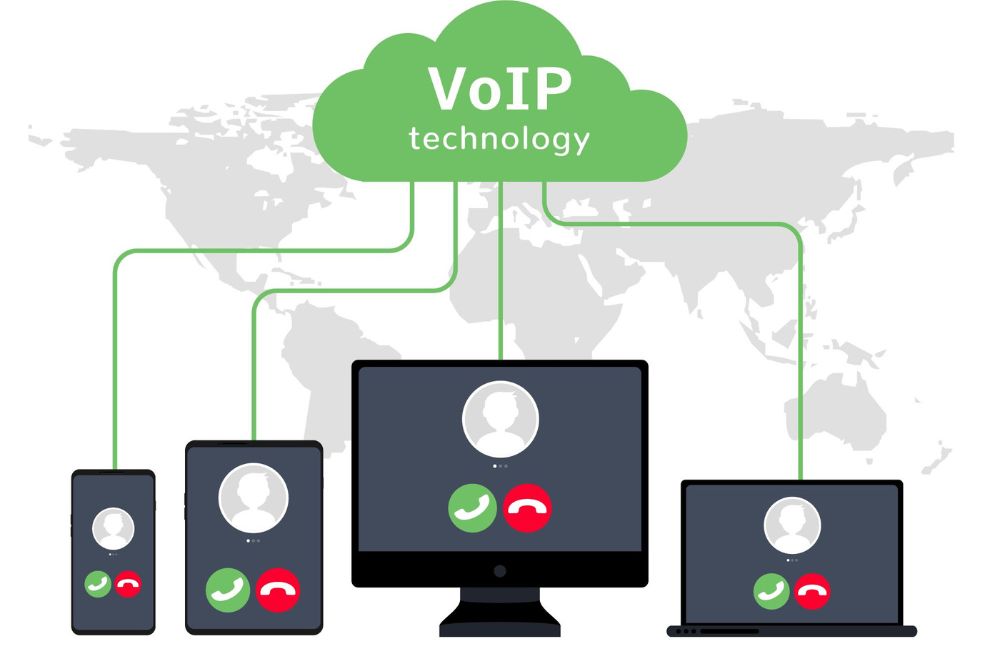In a world where everything is going digital, shopping, meetings, even doctor appointments, it’s no surprise that phone calls are, too. You’ve probably heard the term “VoIP” thrown around in business conversations or while browsing internet plans. But what exactly is it? And more importantly, how does it help businesses communicate better, faster, and more affordably?
If you’re curious but don’t want to fall down a tech rabbit hole, you’re in the right place. This guide breaks down VoIP in simple terms, explains how it works, explores your options, and helps you figure out if it’s right for your business.
Let’s dive in.
What Is VoIP?
VoIP stands for Voice over Internet Protocol. That’s a fancy way of saying phone calls that use the internet instead of traditional phone lines. Think of it like this: instead of your voice traveling through a bunch of copper wires, it gets turned into data and sent over the internet.

If you’ve ever used Zoom, Skype, or even WhatsApp to make a voice call, you’ve already used VoIP, whether you realized it or not.
For businesses, VoIP replaces clunky landlines and outdated phone systems with a more flexible, cost-effective, and feature-rich alternative. All you need is a stable internet connection, and you’re good to go.
How VoIP Works
Here’s how it all comes together in plain English:
When you speak into a VoIP phone or app, your voice gets turned into digital data. That data travels through the internet to the person on the other end, where it gets turned back into sound. It’s kind of like sending your voice as an email that arrives instantly.
Behind the scenes, there’s a lot of smart technology making this happen in milliseconds. But for you, it feels like a regular phone call, just smarter, faster, and more flexible.
VoIP can work through several devices:
- Desk phones designed for VoIP
- Mobile apps on your smartphone
- Software on your computer (called “softphones”)
- Web-based dashboards
This flexibility makes it ideal for modern businesses, especially those with remote teams or employees on the go.
Types of VoIP Services
Not all VoIP systems are created equal. Depending on your business size, budget, and setup, you’ll want to choose from a few different types of VoIP services. Here’s a breakdown of the three main categories:
Hosted VoIP (Cloud-based VoIP)
This is the most popular option for small to mid-sized businesses. With hosted VoIP, everything lives in the cloud. That means no bulky hardware or complicated maintenance, your provider handles all of that for you.
You just plug in your VoIP phones (or use your computer or mobile device), and you’re ready to make calls. It’s a plug-and-play kind of deal, which is perfect if you don’t have a dedicated IT team.
Pros:
- Easy to set up
- Scales with your business
- Minimal upfront costs
- Always up-to-date with the latest features
On-Premises VoIP
This setup is more hands-on. With on-premises VoIP, your company owns and manages all the hardware and software. The equipment usually sits in a server room at your office.
This option gives you more control, but it also means more responsibility. You’ll need IT support to maintain the system and troubleshoot any issues.
It’s usually used by larger businesses or companies with strict security needs.
Pros:
- Full control over system and security
- Can be customized for specific needs
Hybrid VoIP Solutions
Can’t decide between cloud and on-prem? Hybrid VoIP combines the best of both worlds. You might use cloud-based VoIP for remote workers and an on-prem system for your main office.
This setup gives you flexibility while keeping some control in-house. It’s great for companies that are in transition or have a mix of remote and in-office staff.
Residential vs. Business VoIP
If you’ve seen VoIP services advertised for homes, you might wonder how they differ from business VoIP. The main differences come down to features, scalability, and reliability.
Residential VoIP is usually just for basic calling, think of it as a digital replacement for your home landline. It’s perfect for staying in touch with family or making international calls on the cheap.
Business VoIP, on the other hand, is built for teams. It comes with professional features like:
- Call forwarding
- Auto attendants (that friendly “Press 1 for Sales…” voice)
- Call recording
- Voicemail-to-email
- Video conferencing
- CRM integrations
Plus, business VoIP is designed to support multiple users at once, handle high call volumes, and offer better uptime and support.
Benefits of Business VoIP
So, why are so many businesses switching to VoIP? Because it’s a game-changer. Here’s what makes it such a smart move:
Cost Savings Compared to Traditional Phone Lines
Let’s be real—landlines are expensive. You pay per line, per feature, and per long-distance minute. VoIP throws all that out the window.
With VoIP, you usually pay a flat monthly fee per user, and it includes local and even international calls. You don’t need separate lines for each employee, and you don’t need to buy expensive hardware either. Many businesses save 30–50% or more just by making the switch.
Scalability and Flexibility for Remote Work
Got a new hire starting tomorrow? With VoIP, you don’t need to install a new phone line. Just set them up with a VoIP app, and they’re ready to roll, whether they’re in the office or working from a cabin in the woods (as long as there’s Wi-Fi).
VoIP makes it easy to scale your communication tools as your business grows. You can add or remove users with a few clicks.
Remote work? No problem. VoIP keeps your team connected no matter where they are.
Advanced Features
VoIP doesn’t just replace your old phones, it upgrades them. Most business VoIP systems come with features that used to be reserved for big corporations.
Here are just a few:
- Auto-attendant: A virtual receptionist that routes calls to the right person
- Call recording: Great for training and quality control
- Voicemail to email or text: Never miss an important message again
- Call analytics: Track call volumes, wait times, and more
All of this helps your team work smarter, not harder.
Integration with CRM and Other Business Tools
This is where VoIP really shines. Many systems integrate with tools you already use, like your CRM, helpdesk software, or project management platforms.
That means your sales team can see a customer’s history the moment they call. Your support team can log calls automatically. And you can keep everything connected without switching between ten different apps.
How to Choose the Right VoIP Provider
Choosing a VoIP provider isn’t just about price. You’ll want a partner that fits your needs, grows with your business, and delivers reliable service. Here are a few key things to look for (without sounding like a checklist):

First, think about reliability. You want a provider with strong uptime (99.9% or higher is the gold standard). Downtime means missed calls and frustrated customers.
Next, consider the features you really need. Some businesses just want basic calling. Others want call queues, analytics, and CRM integration. Make sure your provider offers what you’re actually going to use.
Customer support is also huge. When something breaks (and eventually, something always does), you want fast, helpful support, not a robot reading from a script.
And finally, look for scalability. Your business might be small today, but what about next year? The right provider should be able to grow with you without locking you into expensive upgrades.
Setting Up VoIP for Your Business
Worried about a complicated setup? Don’t be. One of the biggest perks of VoIP is how easy it is to get started.
If you go with a hosted VoIP service, the setup can be as simple as:
- Choosing your plan
- Creating user accounts
- Downloading the VoIP app or plugging in your phones
- Configuring basic settings (like voicemail or call forwarding)
- Most providers offer step-by-step guides, and some even assign you a setup specialist.
If you’re switching from a traditional phone system, you can even port your existing numbers so your customers don’t have to learn new ones.
And once you’re set up, you’re in control. You can add new users, change settings, and monitor calls, all from an online dashboard.
Conclusion
VoIP isn’t just the future of phone calls, it’s the present. It gives businesses of all sizes a smarter, cheaper, and more flexible way to stay connected. Whether you’re a startup looking to keep costs low, a remote team needing flexibility, or a growing business ready for better features, VoIP has something to offer.
And the best part? You don’t have to be a tech genius to use it. With the right provider, VoIP can feel just as easy as picking up the phone, but with way more perks. So if you’re still clinging to a dusty landline or juggling a tangle of phone cables, maybe it’s time to make the switch. The internet is calling. Literally.
